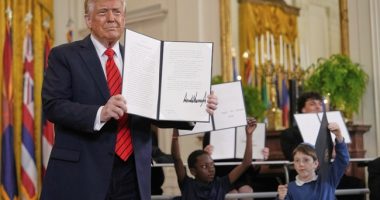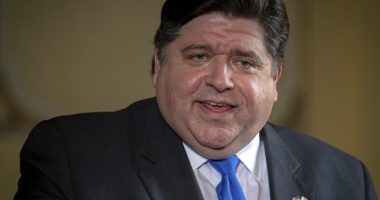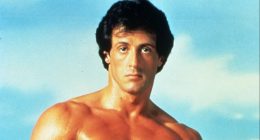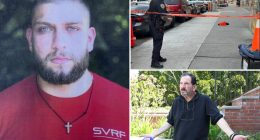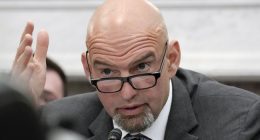Wiradjuri elder ‘Riverbank Frank’ Doolan says he will vote No on the Indigenous Voice to Parliament because it is racially divisive.
The respected community leader and poet, who lives in a caravan on the banks of the Macquarie River on outskirts of Dubbo in central NSW, said he believes the change would create division between Indigenous communities and wider Australia.
Australians will be asked to vote ‘Yes’ or ‘No’ on October 14 on whether to enshrine in the Constitution an Indigenous body which must be consulted on all proposed laws that affect Aboriginal and Torres Strait Island people.
Mr Doolan told journalist Hugh Riminton this week: ‘Altering the constitution along racial lines, to me that’s repugnant’.
He sent Riminton a follow up message saying that he doesn’t intend to ‘court controversy’ and has ‘no animosity towards Yes voters’ Indigenous or otherwise.
‘I love my people and I love their right to vote as they see fit. I’m simply one black man with an opinion. Respect, tolerance, peace,’ he wrote.


Aboriginal elder ‘Riverbank Frank’ Doolan has revealed he will be voting No in the Indigenous Voice to Parliament referendum saying he believes the change will be divisive
Riminton’s post to X, formerly Twitter, caused a stream of comments.
‘I’m meeting a few Aboriginal people up here saying no,’ one person from the Northern Territory wrote.
‘Some want treaty first. Some just No. But many more absolutely wanting Yes. There are four Land Councils in NT representing 30 per cent of Territorians who are Indigenous. All four support the Voice,’ they said.
Riminton agreed, saying most Aboriginal people he had spoken to about the Voice intend to support it in the October 14 poll.
‘From hard, enthusiastic Yes, to ‘meh, yes’. The No’s tend to fall into either ‘it will make no difference’ or ‘it’s just a bloody advisory body – we’ve gotta do better than that!’
Mr Doolan previously told The Western Herald, the local newspaper of Bourke where he is from before he moved to Dubbo, that the Voice sounded to him like a new version of the Aboriginal and Torres Strait Islander Commission (ATSIC) – the former body representing indigenous people which was abolished.
‘None of us know too much about the Voice to Parliament, but what’s suggested, and proposed with an almighty flourish that makes us believe they’re doing something magnificent for Australia, is a re-hashed version of ATSIC,’ he said.
‘As an indigenous man, I reject the government assertion that we need another Voice to understand and hear Aboriginal people,’ Mr Doolan said.
‘They have known about Aboriginal people since the Whitlam days when we had our first Minister for Aboriginal Affairs.’




Mr Doolan, who lives in a caravan on the outskirts of Dubbo (left), sent a follow up text message to Riminton further explaining his views (right)


Wiradjuri elder ‘Riverbank Frank’ Doolan has explained why he is voting No on the Indigenous Voice to Parliament
Opposition to the Indigenous voice to parliament has now tipped over into the majority according to a new poll.
Newspoll, conducted for The Australian, showed support for constitutional change has fallen to 38 per cent, while backing for the ‘no’ vote has risen to 53 per cent.
Consecutive polls have shown support for the voice has been sliding.
Success will require a majority of voters and a majority of states voting in favour.
Despite the polls, Minister for Employment Tony Burke said he was confident the referendum would succeed.
‘(Opposition Leader) Peter Dutton has underestimated the goodwill of a whole lot of Liberal voters here as well,’ he told ABC radio on Monday.
Read Related Also: Hmmm: Caltech drops calc, chem and physics reqs "if your school didn't offer them"
‘There’s a generosity in the Australian people and as people come closer to the date, focus their minds, look at the proposal, we see something where there’s nothing to lose and everything to gain.’
Mr Dutton has confirmed that, should this referendum fail, he would hold a second plebiscite proposing formal recognition of indigenous people in the Constitution, but without the consultative role of the Voice.
‘Yes, I believe very strongly that is the right thing to do,’ he told Sky News.
‘But enshrining a Voice in the constitution is divisive.’


Opposition leader Peter Dutton (pictured centre with Jacinta Nampijinpa Price) has said he would hold another referendum to recognise First Nations Australians in the Constitution but leave out the Voice
Under Labor’s plan, which follows the Uluru Statement from the Heart, the Voice would be able to advise parliament and the executive government on issues affecting Aboriginal and Torres Strait Islander people.
Mr Dutton again argued the Voice would ‘divide the country down the middle’ and fail to deliver practical outcomes for Indigenous Australians.
Megan Davis, an Aboriginal activist who has been one of the prominent proponents of the Voice, said Aboriginal people would not accept the powerless Constitutional recognition Mr Dutton proposes.
‘There’s a unity ticket among Australians on this point: there is no use going to a referendum if it’s not going to change the daily lives of First Nations peoples,’ Professor Davis, one of the architects of the Uluru Statement, told reporters on Sunday.
‘There’s zero evidence anywhere in the world that a statement of recognition (on its own) changes anything.’
Uluru Dialogue strategic advisor Kirstie Parker said Mr Dutton’s comments showed he was not listening to Aboriginal and Torres Strait Islander people, the majority of whom are in favour of the Voice according to YouGov and Ipsos polls conducted earlier this year.
‘Some people have said the referendum is an expensive exercise and yet here we have an opposition proposing to spend the same amount of money on something that would not change lives,’ Ms Parker said.
The Uluru Dialogue – the organisation dedicated to advancing the Uluru Statement – would continue to combat that through ‘face-to-face yarns’ with Australians, Prof Davis said.


Both the Yes and No campaign are ramping up ahead of the October referendum
Nationals Leader David Littleproud backed his Liberal counterpart Mr Dutton on Sunday, saying the referendum would pass ‘with flying colours’ if the scope of the Voice was more defined and limited.
‘If it does go down on October 14, I’m pledging my leadership to restart a process to make sure we do get to constitutional recognition,’ he told Nine’s Weekend Today program.
The ‘Yes’ campaign on Sunday announced it had secured permission to use John Farnham’s famous song, ‘You’re the Voice’.
Asked if he thought Farnham’s support would make a difference to the ‘Yes’ campaign, Mr Littleproud claimed Australians don’t understand what a voice to parliament means.
‘The line, ‘You’re the Voice, try to understand it’, is a big one,’ he said.
‘The prime minister might want to have a little think about that today.’
The referendum’s success depends on majority support across the country and in four of six Australian states.
The referendum question is: ‘A Proposed Law: to alter the Constitution to recognise the First Peoples of Australia by establishing an Aboriginal and Torres Strait Islander Voice. Do you approve this proposed alteration?’
If successful the government will design the specific form of the voice, which will be implemented via legislation debated and passed by federal parliament.



